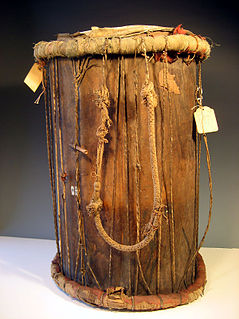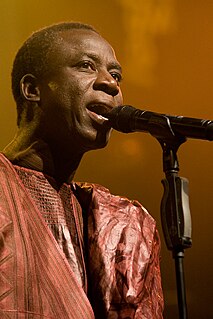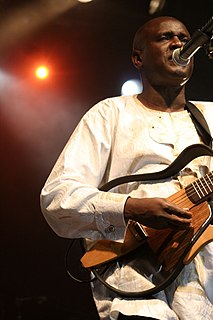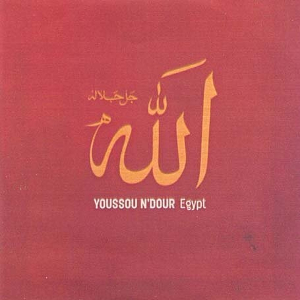
Youssou N'Dour is a Senegalese singer, songwriter, composer, occasional actor, businessman, and politician. In 2004, Rolling Stone magazine described him as, "perhaps the most famous singer alive" in Senegal and much of Africa. From April 2012 to September 2013, he was Senegal's Minister of Tourism.

Senegal's music is best known abroad due to the popularity of mbalax, a development of Serer sabar drumming popularized by Youssou N'Dour.

Ibrahima Sylla was a Senegalese record producer born in Ivory Coast and founder of the African music label Syllart Records. He was an internationally acclaimed musician whose production and music direction defined popular African music. From West African dance, to Congolese Soukous, to melodic griot-led songs, Sylla's signature as a music producer is unmistakable. He has demonstrated his familiarity with many contemporary African musical genres, and he has worked with most of Africa's musical greats.

Orchestra Baobab is a Senegalese band established in 1970 as the house band of the Baobab Club in Dakar. Many of the band's original members had previously played with Star Band de Dakar in the 1960s. Directed by timbalero and vocalist Balla Sidibe, the group features saxophonists Issa Cissoko and Thierno Koité, two singers, two guitarists and a rhythm section with drums, congas and bass guitar. Since their formation, the band has predominantly played a mix of son cubano, Wolof music, and to a lesser extent Mande musical traditions.

The Wolof, the largest ethnic group in Senegal, have a distinctive musical tradition that, along with the influence of neighboring Fulani, Tukulor, Serer, Jola, and Malinke cultures, has contributed greatly to popular Senegalese music, and to West African music in general. Wolof music takes its roots from the Serer musical tradition, particularly from the Serer pre-colonial Kingdom of Saloum. Virtually all Wolof musical terminology including musical instruments comes from the Serer language.

Thione Ballago Seck is a Senegalese singer and musician in the mbalakh genre. Seck comes from a family of "griot" singers from the Wolof people of Senegal. His first job was with Orchestre Baobab, but he later formed his own band, Raam Daan, which he still heads.
Ashley Maher is a Canadian singer and songwriter who has meshed the rhythmic impulses of West Africa and Latin America with Western song structures.
Julia Sarr is a Mezzo-soprano born in Dakar (Senegal) from the Serer ethnic group. As one of the most sought after backing vocalists, she has worked with several prominent artists over the years including Youssou N'Dour, Lokua Kanza and Patrice Larose.
Mbaye Dieye Faye is a singer and percussionist from Senegal.

Ismaël Lô is a Senegalese musician and actor. He was born in Dogondoutchi, Niger on 30 August 1956, to a Senegalese father and a Nigerien mother. Shortly after Lo's birth the family returned to Senegal where they settled in the town of Rufisque, near the capital Dakar. He plays guitar and harmonica, and has been called "the Bob Dylan of Africa".

Alioune Mbaye Nder is a Senegalese singer. Nder takes his name from the n'der, the drum favoured by his griot father.
Habib Faye was a bassist, keyboardist, guitar soloist, arranger, composer and Grammy-nominated producer from Senegal. He was mostly known as the musical director for Youssou N'dour's Super Étoile de Dakar. He was one of the most talented African bassists of the last quarter-century.

Egypt is a Grammy Award-winning album by the Senegalese musician Youssou N'Dour, on which he is accompanied by the Egyptian Fathy Salama Orchestra. By incorporating Arabic influences and focusing on Muslim religious themes, the album was a departure from previous N'Dour releases. In the original Senegalese release, it was named Sant Allah.

Immigrés is a 1984 album by Senegalese singer and percussionist Youssou N'Dour. AllMusic remarks that the album is "a good part of what put [N'Dour] on the international map".
Raam Daan is a mbalax band from Senegal. Founded in 1974 by Thione Seck, Raam Daan has risen to become one of the most popular mbalax bands in Senegal.
Étoile de Dakar were a leading music group of Senegal in the 1970s.
The Njuup tradition is a conservative Serer style of music rooted in the Ndut initiation rite.
Soriba Kouyaté (1963–2010) was a Senegalese kora player. He was born in Dakar, the son of kora player Mamadou Kouyaté.













